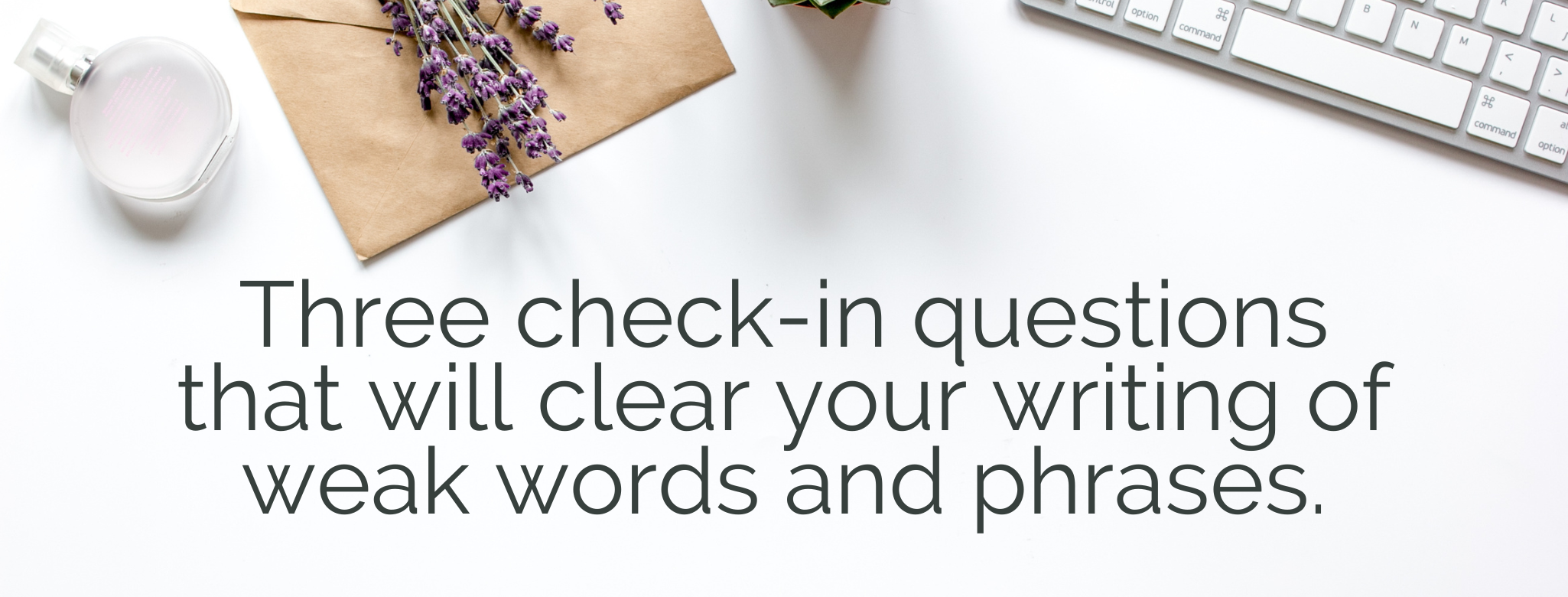There are several easy traps to fall into when writing a manuscript. It is only natural that after building and developing your story and characters for so long, you might lose sight of which words and phrases are strongest and which ones can be changed or removed.
Weak words and phrases are common for every writer at some stage of the writing process; however, identifying and correcting them will set you on the right track to telling a strong and compelling story.
What are weak words or phrases?
Weak words and phrases are extra or unnecessary words that crowd your writing. When you combine too many of these words and phrases, you lose momentum in your story and your reader will find it difficult to stay engaged through the book.
There are some common categories of words that are considered weaker; when you know what they are it becomes easier to remove them and update your writing.
As you read your manuscript stop and ask yourself these three questions:
1. Am I telling or showing?
Telling involves overexplaining the storyline from the narration or author instead of having the characters tell the story from their point of view.
For example, telling the reader about a surprising event would involve the use of adverbs such as usually, daringly, wildly, unfortunately or unbelievably. These adverbs can be replaced by character movements, reactions and thought processes. By focusing on the characters and their scenario, you can create a stronger connection with the reader and show them how the scenario is playing out.
Another way you may be telling instead of showing is with ‘to be verbs’. ‘To be verbs’ include words such as was, is, were, and are, and can be a sign that a stronger and more descriptive verb can be used in its place.
An example of this could be “Sarah was tired”. This is telling the reader what Sarah is feeling, instead of allowing Sarah’s actions to clarify the situation. Rethinking these verbs could look like, “Sarah collapsed onto the couch and stifled a yawn.”
Finally, words that tell us a character is feeling and thinking are usually unnecessary and are another sign that you are telling vs showing. In most cases, when the character says, “I was thinking about how much fun we had last week,” the thinking component can be removed and a stronger sentence would be, “We had so much fun last week.”
2. Am I adding unnecessary words?
Being able to look back over your work with a critical eye on these words will help the strength of your writing and the overall readability. It will also allow you to focus on other areas of improvement when you work with an editor on your book.
Look out for the following unnecessary words in your writing:
- Excessive dialogue tags. These are needed when constructing good dialogue; however, adding one at the end of every single piece of dialogue will slow the story down and isn’t needed by the reader. Start the conversation with them and slowly remove them as the conversation goes on.
- Then / That / Just. These three words have a time and place to be used; however, they’re also filler words that are often unnecessary and don’t alter the story when removed.
- Tautologies. When two words mean the same thing but are used together in writing, it is called a tautology. An example of this is, “evening sunset” or “have got”. In these instances, you can remove “evening” and “got”; the sentences will have the same meaning.
- Start/Begin/Up/Down/Thing/It/Really/Very. It may seem that these words don’t have anything in common! However, in most instances, these words can be replaced with a stronger verb to portray what’s happening in the story. Some examples of this are: He started to walk towards me. It is not necessary to include “started” in this sentence, and a much stronger sentence would remove it and instead get straight to the point: He walked towards me.
Begin: He began talking about his job. Vs He spoke about his job.
Up/down: She sat down on the bed. Vs She sat on the bed.
Thing/It: These are vague words that don’t describe what’s being talked about. Wherever possible, it will create a stronger story to use a more specific word to describe the object.
Really/Very: The night air was very cold. Vs The night air was freezing.
3. Am I using words repetitively?
Some words commonly used are breathing words such as breathe, breath, inhale and exhale. Relying on these words to describe character actions can get repetitive, and there are other ways to show their breathing has changed based on events.
Another set of words to look out for in your writing is shrug/nod/smile/reach. Sometimes these are exactly what the situation needs; however, there are many other ways of showing these actions to the reader that will create interest and variation in your writing. Try showing the varying levels of the urgency of these actions by how they are used, for example, smiled vs beamed.
Creating an interesting and engaging story for your reader requires thinking of all these different phrases and words and assessing your use (or overuse!) of them. With practice, they will become easier to spot and change to reflect the purpose of your characters and the story development.





